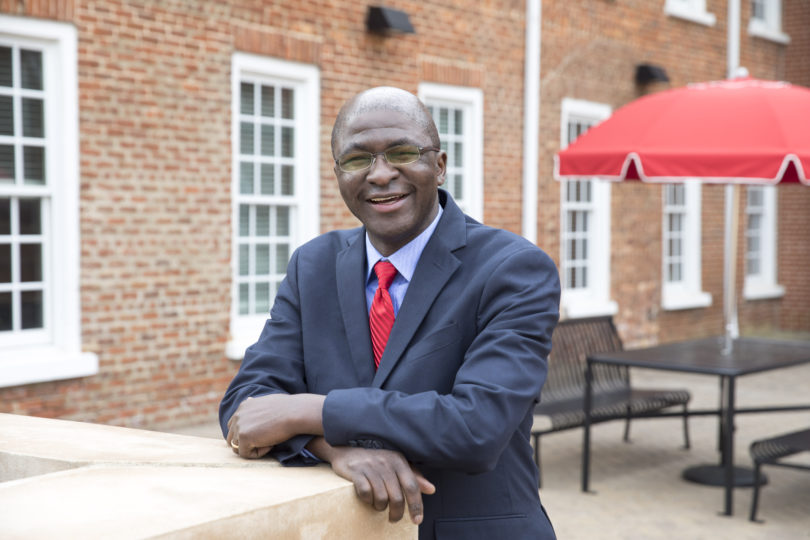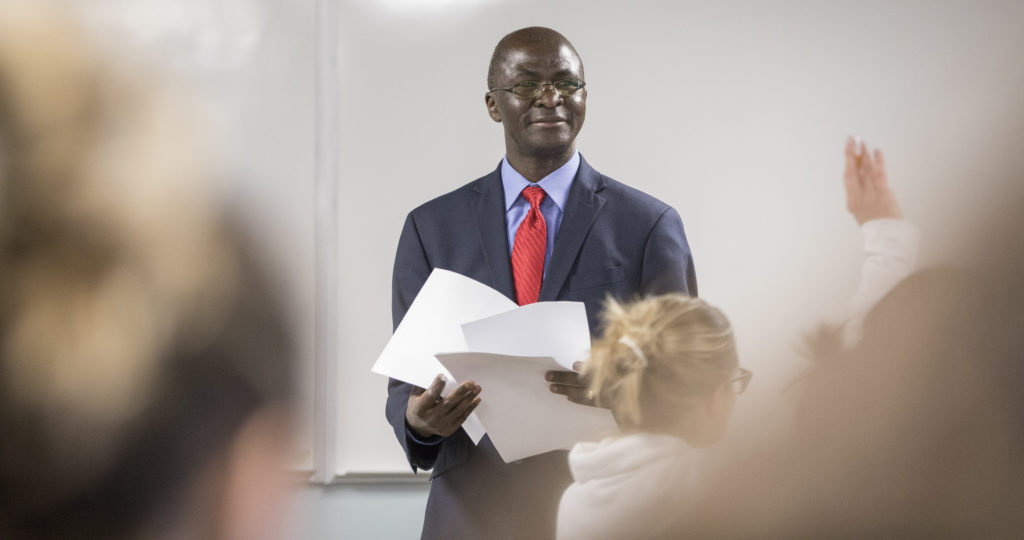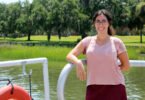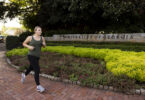David Okech, an associate professor in the School of Social Work, hopes his students leave his courses informed, inspired and ready to be involved in making the world a better place for individuals, families, groups, communities and nations.
Where did you earn degrees and what are your current responsibilities at UGA?
I earned my bachelor’s degree in social work from the University of Nairobi in 1995 and my Master of Social Work degree with a graduate certificate in leadership in education and neurodevelopmental disabilities from the University of New Hampshire in 2004. I earned my doctorate from the University of Kansas in 2008. Presently, I am the director of the Master of Social Work program in the School of Social Work. The MSW is among the largest graduate programs at UGA.
When did you come to UGA and what brought you here?
I came to UGA in 2008 because of the reputation of the university and the stature of the faculty in the School of Social Work. I had cited some of them in my work as a doctoral student, and it was wonderful to finally have them as colleagues. The search committee took time to tell me about the school, the vision and opportunities both in the School of Social Work and the community in general. I was attracted by the strengths and diversity of the SSW faculty. Athens was another added factor compared to the cities that made offers at the time. When I looked at UGA as a whole, there was a feeling that in the next few years, it would be launching into a new and exciting higher level. I am happy with the strides that the UGA and the SSW have made in my decade here.
What are your favorite courses and why?
I love “Social Welfare Policies, Programs, and Issues” and “Data Analysis and Inferential Statistics in Social Work” courses nearly equally. The policy course for master’s-level students helps them understand the interconnection between policies and macro- or micro-level problems and solutions. Students understand the manifest and latent goals of major policies in the U.S., sometimes to their complete surprise. Education is fun when students have those “aha” moments. My students in the doctoral-level statistics course will tell you that the class motto on statistics is: it’s free, it’s fun, and we love to do statistics. It is extremely gratifying to see students who come into the class petrified about statistics and data actually say the course motto in a manner that makes me believe they mean every word. I also enjoy working one-on-one with undergraduate research students in the CURO program and on doctoral dissertation committees.
What are some highlights of your career at UGA?
- Over $4 million in training and research grants.
- Initiation of cutting-edge research on human trafficking in West Africa that has global implications.
- Induction into the Society for Social Work and Research (SSWR), our premier research organization, as a Fellow in 2017.
- Nomination by the SSWR board to run for position of board vice president in 2018.
- Participation in the Southeastern Conference Academic Leadership Development Program, 2017-2018.
- Serving as SSW director of global engagement (2013-17) and leading education abroad programs to Ghana and Northern Ireland.
- Serving as the SSW MSW program director and revising and reorganizing the MSW curriculum with stakeholder input.
- Serving as board vice president (2011-2015) of Family Counseling Services of Athens Inc., a local nonprofit.
- Serving in various university committees and subcommittees, thus meeting colleagues from other academic units.
How do you describe the scope and impact of your research or scholarship to people outside of your field?
My foundational research on the economic development of lower-income, lower-asset households highlighted the importance of service and programmatic factors in helping these families save and build financial assets. Earlier theories had highlighted individual- and institutional-level factors as important variables in determining asset accumulation; this has since shifted in programs that assess how the provision of financial education programs and other program supports can enhance the financial capabilities of these households. I am proud of that contribution to the field of asset building and financial capability. My transition to focus on a hard-to-reach population in the area of human trafficking is important in helping us focus on the victim/survivor side of the problem. The gap in evidence-informed services for trafficking survivors is one we are in the process of filling. This is very important for survivors themselves and service providers, as well as policymakers who make funding decisions.
How does your research or scholarship inspire your teaching, and vice versa?
In the doctoral statistics course, we look at the process of design to dissemination of research. I pose questions about some of the challenges in either the design or statistical analyses of data from my own experience, and students have provided very wonderful feedback. Students inquire about ethical issues in my research or how to reach and retain samples. While serving as a journal guest reviewer for a special issue, I recently involved some of my doctoral students in the peer-review process, where they gained practical experience in reviewing journal articles. The students had initially performed a class assignment on article review and, to be very honest, the quality of the reviews by our students was excellent. Students in my policy course have heard everything about human trafficking policies and practices; I use some of my publications to enhance their knowledge of the issue, as it lends itself very well to the course.
What do you hope students gain from their classroom experience with you?
Three I’s — that they are informed, inspired and ready to be involved in making the world a better place for individuals, families, groups, communities and nations.
Describe your ideal student.
The student who likes to say, “but … I was thinking … I just don’t think … that is quite interesting … Aha … when I was reading the text … I looked at this other article (that is not part of the readings!).”
Favorite place to be/thing to do on campus is …
… walking on the Spec Towns track on a nice evening with my family or spending a Saturday afternoon at the Ramsey Center. Looking outside my window and seeing the Oconee River come to life during rainy seasons.
Beyond the UGA campus, I like to …
… spend time with my family watching a movie, visiting friends or hosting them, and joining discussions on various social media groups, especially those that keep me connected to my country of origin, Kenya. I like to visit or host colleagues from Kenya in different U.S. institutions of higher learning; we share experiences and just pretend that we are in Kenya, talking ‘till 1 in the morning!
Community/civic involvement includes …
I provide a lot of informal mentoring to young people in the community here in Athens as well as through the social media to many others in Africa. I am also a pro bono consultant with various non-governmental organizations in Kenya and Ghana. I also help in fundraising for local nonprofits as well as community-based initiatives in both Ghana and Kenya. Together with my friends, we just completed a successful fundraiser for an outreach program in western Kenya that uses soccer as a tool for transformation in the areas of youth health, well-being, and economic development.
Favorite book/movie (and why)?
I like the movie “Spirit: Stallion of the Cimarron.” It is set in the Wild West and depicts a captured wild stallion that resists all efforts to train and tame it. It endures a lot of suffering with the hope of freedom. Through sheer strength and strong will power, it gains freedom and returns to the wild, an environment that provides him with the comfort that he yearns for and reunites him with his herd.
I also like the book, “Anyway: The Paradoxical Commandments: Finding Personal Meaning in a Crazy World” by Kent Keith.
The one UGA experience I will always remember will be …
… being flagged by parents of one of my students during a spring graduation and told how their daughter talked about my class during that entire Thanksgiving break. They told me that she was a different daughter than the one they sent to the UGA, and how proud they were of her and the program. I always wish that moment was captured on YouTube!
Is there anything else you’d like to add?
I am grateful to my wonderful colleagues in the SSW, including my dean, Dr. Anna Scheyett, who is not only a competent leader and scholar but also a wonderful person and role model. I am looking forward to the future with hope and excitement for me, the SSW and UGA.
Originally published on March 25, 2018









